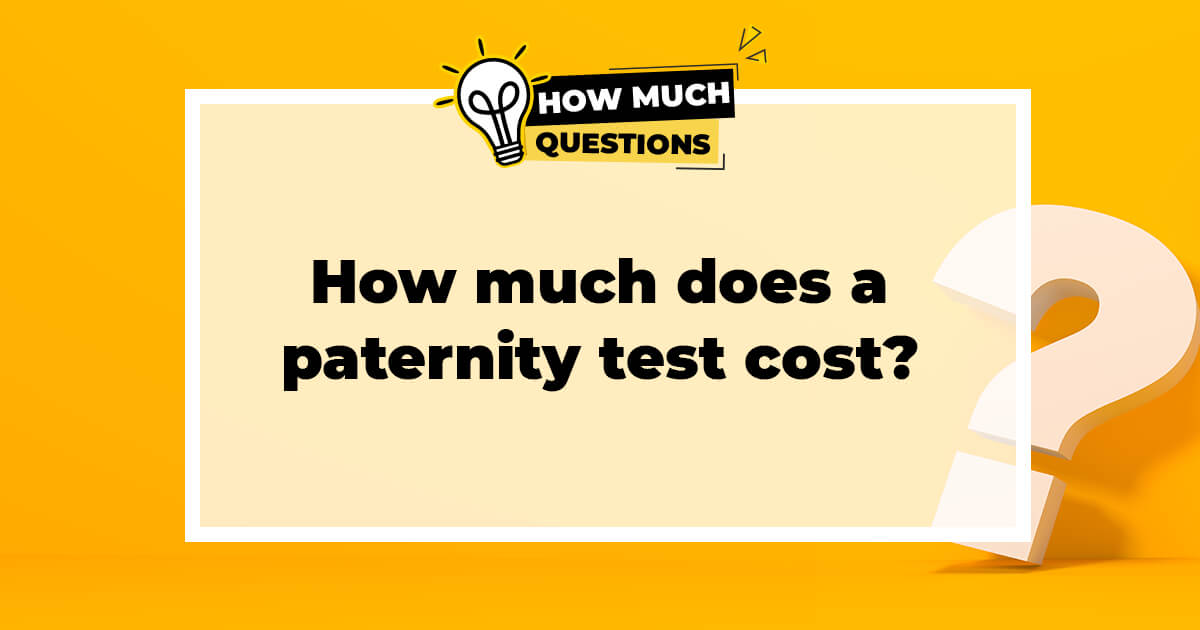
How Much Does a Paternity Test Cost?
Discover the factors affecting paternity test prices and get tips for saving money without compromising accuracy.

Introduction
Paternity testing is a crucial step in resolving questions of biological parentage. But before you commit to this important process, it's essential to understand the cost implications. In this article, we'll delve into the various factors that influence the cost of a paternity test, offer pre-purchase considerations, provide cost-saving tips, and guide you towards making the best choices.
How Much Does a Paternity Test Cost?
The cost of a paternity test typically ranges from $100 to $500. The price can vary based on factors such as the testing method, the location of the testing facility, and whether the test is court-admissible. Home paternity test kits are generally more affordable, starting at around $100. In contrast, legal paternity tests, which are admissible in court and require a chain of custody procedure, tend to be more expensive, often exceeding $300. It's essential to choose a reputable lab accredited by the AABB (American Association of Blood Banks) to ensure accuracy and reliability.
Factors Influencing Cost
1. Testing Method
The method you choose plays a significant role in determining the cost. DNA testing methods such as PCR and SNP analysis can vary in price due to their complexity and accuracy.
2. Number of Individuals
The cost increases with the number of individuals involved in the test. Testing just the alleged father and child is cheaper than involving additional parties.
3. Laboratory Reputation
Opting for a reputable and accredited testing laboratory may cost more, but it ensures accuracy and reliability.
4. Turnaround Time
Faster results often come at a premium price. Consider your urgency when selecting the turnaround time.
5. Legal vs. Non-Legal Testing
Legal paternity tests, often required for court purposes, come with extra documentation and certification costs compared to non-legal tests.
Pre-Purchase Considerations
1. Legal Implications
Understand the legal requirements in your jurisdiction for paternity tests, as they may affect your choice of testing method.
2. Consent
Ensure that all parties involved, especially minors, provide informed consent before proceeding with the test.
3. Privacy
Consider the privacy and confidentiality policies of the testing laboratory to protect your sensitive information.
4. Accuracy
Balancing cost and accuracy is vital. Avoid opting for the cheapest option if it compromises the reliability of results.
Cost-Saving Tips
1. Bundle Testing
If possible, bundle multiple individuals' tests into a single package for potential cost savings.
2. Research Discounts
Check for promotions, discounts, or group rates from reputable testing providers.
3. Consider At-Home Kits
At-home paternity test kits can be more affordable than clinical tests while providing accurate results.
Guidance for Optimal Choices
To ensure the best decision-making:
- Consult with a genetic counselor for advice on the most suitable testing method.
- Read reviews and seek recommendations for trustworthy testing laboratories.
- Assess your legal requirements and consult with an attorney if necessary.
Conclusion
Understanding the cost factors and considerations associated with paternity testing is crucial. Weigh your options carefully, considering accuracy and legal requirements. Remember that this article serves as informational guidance only. For personalized advice, seek the expertise of a genetic counselor or legal professional. Your journey towards clarity and peace of mind begins with informed decision-making. If you have any questions or insights to share, please leave a comment below.
This article is intended for informational purposes only and does not substitute professional advice. Always consult with relevant experts for personalized guidance on paternity testing and legal matters.
FAQ: Frequently Asked Questions
How accurate is a DNA paternity test?
DNA paternity tests are extremely accurate. A test can show with 99.9% accuracy if a man isn't a person's biological father. Establishing paternity can be essential for various reasons, such as legal matters and personal assurance.
Why do people need DNA paternity tests?
People often require DNA paternity tests to establish paternity for legal reasons, including child support, social security, child custody, and placing a parent's name on a birth certificate.
How much does a prenatal paternity test cost?
The cost of a DNA test during pregnancy can vary. In the U.S., procedures like amniocentesis or CVS testing can exceed $500. Non-invasive prenatal tests are pricier, ranging from $1350 to $1750, depending on the speed of results. Health insurance typically doesn't cover these costs.
What is the difference between legal and at-home paternity tests?
Legal DNA paternity tests are used for court cases and typically cost between $300 to $500, including collection costs. At-home paternity tests are non-legal and start at about $60 for the retail kit, not including the testing fee, which can go up to around $200.
How do paternity tests work?
Paternity DNA testing provides scientific evidence by comparing the child's DNA with the profile of the alleged father. This comparison determines whether a man could be a child's biological father.
 How Much Does Carpal Tunnel Surgery Cost?
How Much Does Carpal Tunnel Surgery Cost? How much does adult circumcision cost?
How much does adult circumcision cost? How Much Does an Abortion Cost in California?
How Much Does an Abortion Cost in California? How much does bunion surgery cost?
How much does bunion surgery cost?If you want to know other articles similar to How Much Does a Paternity Test Cost? you can visit the category Medical and Dental.
Leave a Reply







You might be interested in